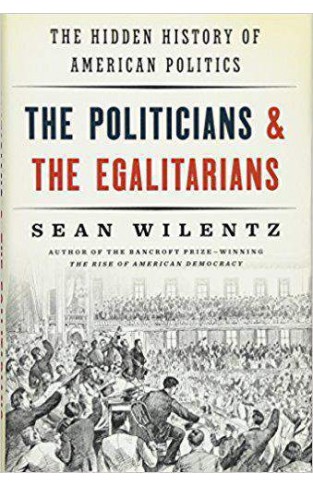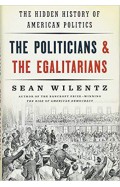- Home
- Books
- Sale
- 11.11 Sale UPTO 90% OFF
- 55% OFF
- The Politicians and the Egalitarians: The Hidden History of American Politics
The Politicians and the Egalitarians: The Hidden History of American Politics
By: Sean Wilentz
-
Rs 4,362.75
- Rs 9,695.00
- 55%
You save Rs 5,332.25.
Due to constant currency fluctuation, prices are subject to change with or without notice.
Historian Sean Wilentz presents two key insights that together reveal a clearer, much-needed vision of American political history. First, partisanship has almost always been a feature of American history and in fact has made possible the nation's greatest social reforms. There is little to be gained from a "post-partisan" political world. Second, the recent attention to economic inequality has a long history. From the founders' generation to the present, America's egalitarian tradition has appeared and reappeared like an underground river. This egalitarian tradition has triumphed-in the Civil War and Progressive eras, the New Deal, the Great Society-not through some sort of bipartisan partnership nor through outsiders' vital protests, but through contentious yet effective party politics. As he did in The Rise of American Democracy, Wilentz masterfully ties together the key figures and moments of American history to completely refresh our thinking about this nation's political and moral character.
| Book | |
| What's in the Box? | 1 x The Politicians and the Egalitarians: The Hidden History of American Politics |
Historian Sean Wilentz presents two key insights that together reveal a clearer, much-needed vision of American political history. First, partisanship has almost always been a feature of American history and in fact has made possible the nation's greatest social reforms. There is little to be gained from a "post-partisan" political world. Second, the recent attention to economic inequality has a long history. From the founders' generation to the present, America's egalitarian tradition has appeared and reappeared like an underground river. This egalitarian tradition has triumphed-in the Civil War and Progressive eras, the New Deal, the Great Society-not through some sort of bipartisan partnership nor through outsiders' vital protests, but through contentious yet effective party politics. As he did in The Rise of American Democracy, Wilentz masterfully ties together the key figures and moments of American history to completely refresh our thinking about this nation's political and moral character.
The Politicians and the Egalitarians: The Hidden History of American Politics
By: Sean Wilentz
Rs 4,362.75 Rs 9,695.00 Ex Tax :Rs 4,362.75
Zubin Mehta: A Musical Journey (An Authorized Biography)
By: VOID - Bakhtiar K. Dadabhoy
Rs 472.50 Rs 1,050.00 Ex Tax :Rs 472.50
The Origins of Political Order From Prehuman Times to the French RevolutioN
By: Francis Fukuyama
Rs 3,116.00 Rs 3,895.00 Ex Tax :Rs 3,116.00
Manning Up: How the Rise of Women Has Turned Men into Boys
By: Kay Hymowitz
Rs 646.75 Rs 995.00 Ex Tax :Rs 646.75
The Obama Syndrome: Surrender At Home War Abroad
By: Tariq Ali
Rs 1,036.00 Rs 1,295.00 Ex Tax :Rs 1,036.00
The Quest For Meaning: Developing A Philosophy Of Pluralism
By: Tariq Ramadan
Rs 1,116.00 Rs 1,395.00 Ex Tax :Rs 1,116.00
The Pakistan US Conundrum Jihadists The Military And The People The Struggle For Control
By: Yunas Samad
Rs 1,116.00 Rs 1,395.00 Ex Tax :Rs 1,116.00
An Enemy We Created: The Myth Of The Taliban Al Qaeda Merger In Afghanistan 19702010
By: Alex Strick van Linschoten
Rs 3,412.50 Rs 5,250.00 Ex Tax :Rs 3,412.50
WikiLeaks: Inside Julian Assanges War on Secrecy
By: David Leigh & Luke Harding
Rs 552.50 Rs 850.00 Ex Tax :Rs 552.50
No recently viewed books available at the moment.
Zubin Mehta: A Musical Journey (An Authorized Biography)
By: VOID - Bakhtiar K. Dadabhoy
Rs 472.50 Rs 1,050.00 Ex Tax :Rs 472.50
The Politicians and the Egalitarians: The Hidden History of American Politics
By: Sean Wilentz
Rs 4,362.75 Rs 9,695.00 Ex Tax :Rs 4,362.75













-120x187.jpg?q6)







-120x187.jpg?q6)



-120x187.jpg?q6)



